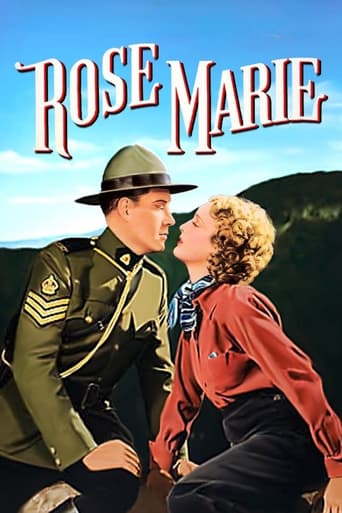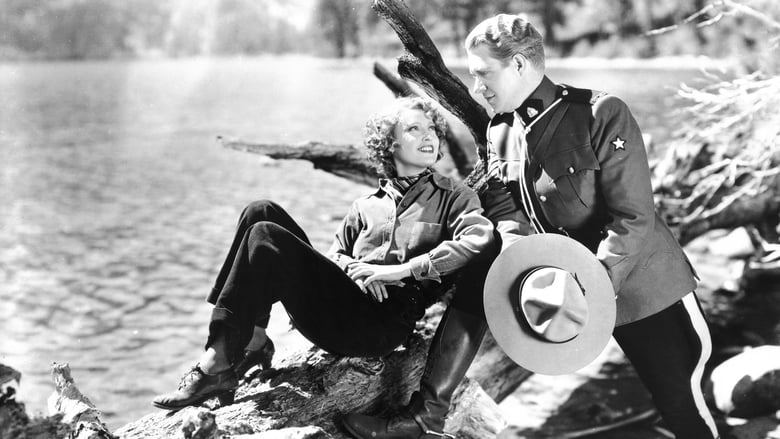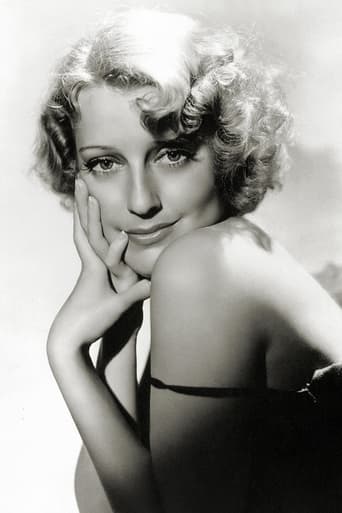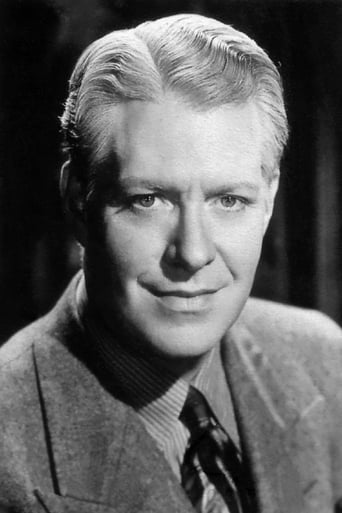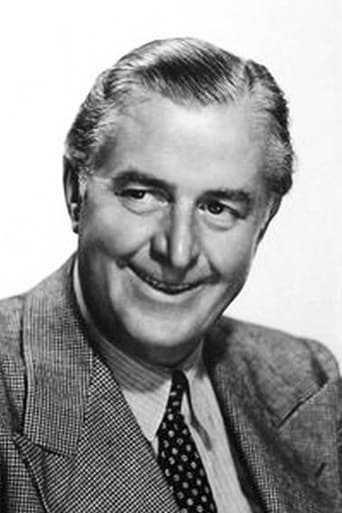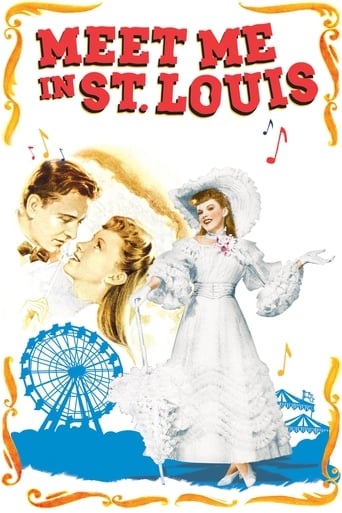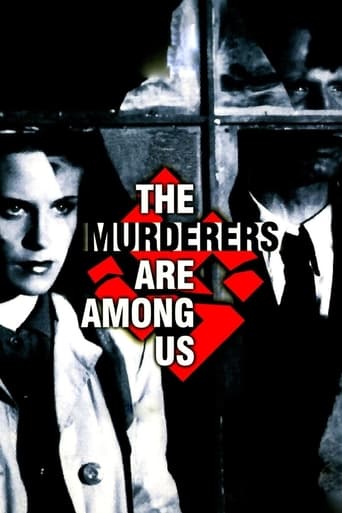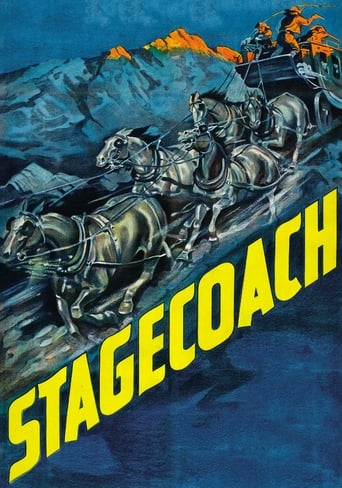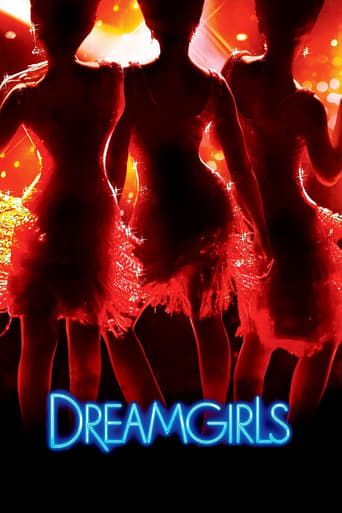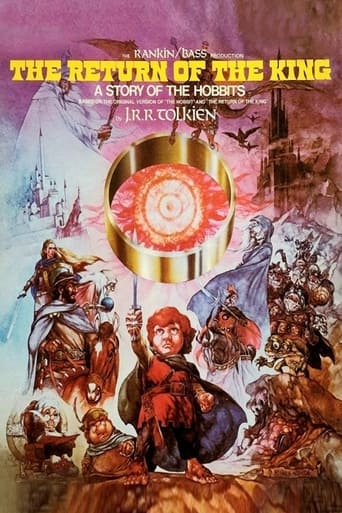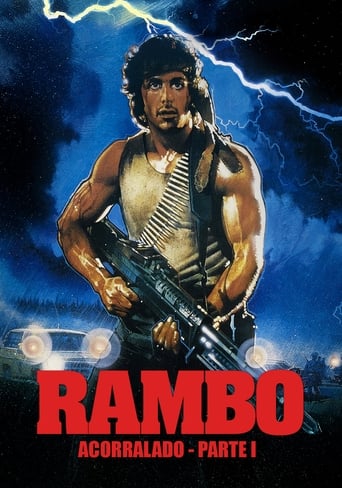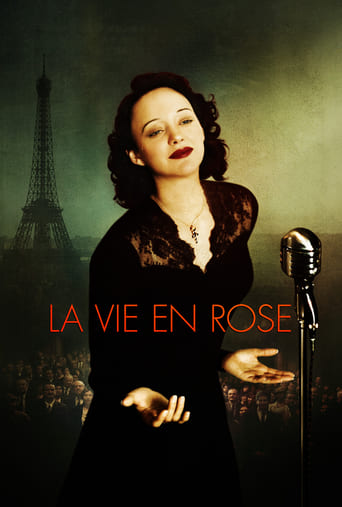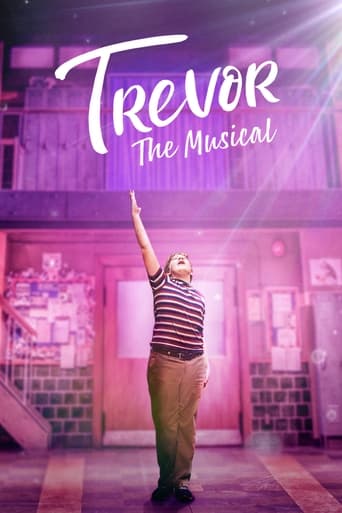Rose Marie (1936)
Opera singer, Marie de Flor, seeks out fugitive brother in the Canadian wilderness. During her trek, she meets a Canadian mountie, Sgt. Bruce, who is also searching for her brother. Romance ensues, resulting in several love duets between the two.
Watch Trailer
Cast


Similar titles
Reviews
Wow, this is a REALLY bad movie!
It's the kind of movie you'll want to see a second time with someone who hasn't seen it yet, to remember what it was like to watch it for the first time.
A film of deceptively outspoken contemporary relevance, this is cinema at its most alert, alarming and alive.
Close shines in drama with strong language, adult themes.
Jeanette MacDonald is Marie de Flor, a temperamental opera singer who's just completed a performance playing Juliet in the fated lover classic from Shakespeare (note the theme); Allan Jones played Romeo. When she returns to her dressing room, she is angered when she smells that her suitor (David Niven) has been smoking in there, something she doesn't tolerate. In fact, she pretty much "rules the roost" and is the "toast of the town" in Montreal, Canada.After throwing the suitor out, Marie fusses with her attendant (Una O'Connor), who gives her a letter from her brother in prison. His parole has just been denied again. Enter her agent (Reginald Owen), who insists that Marie sees some people after the show, which she refuses, until she finds out that one of them is the Premier (Alan Mowbray). Marie then becomes the epitome of graciousness, inviting the Premier and his party to her hotel room, one which even impresses him with its lavishness. Marie's staff is terrified of her, and used to her nature ("close the window quickly before she notices"), but is surprised as Marie charms the Premier, presumably working up to asking him to pardon her brother.After she sings a song chosen by the Premier, however, she receives a ring, her brother's, from a messenger he has sent to her hotel. Upon meeting with the messenger, an Indian, in her room, Marie learns that her brother has escaped from prison, killing a Canadian Mountie in the attempt. She immediately changes clothes, packs her bags, and heads into the wilderness territory with the Indian guide to rendezvous with her brother.About this time, "we" are introduced to the Canadian Mounties, doing maneuvers and singing songs, and one of their best "trackers", who's never failed to "get his man" before, Sergeant Bruce (Nelson Eddy). Of course, Marie and Sgt. Bruce are headed to the same place, a lake lakeside community which serves as a "jumping off" point for travels into the wilderness. There are wanted posters offering $10,000 for John Flowers (James Stewart) plastered everywhere.The Indian guide made off with Marie's money so she tries singing for room and board at a local, rowdy establishment, where the men are more used to poor impressions of Mae West than a ruby-throated opera singer such as herself. Though Marie fails at this, she catches Sgt. Bruce's eye; he has already learned of the robbery and offers to assist her.Since the Indian is Marie's only link to her brother, she is intentionally vague and uncooperative. When Sgt. Bruce reveals that he knows she is Rose Marie de Flor, she tells him that she's just trying to get away from the press, and he believes her. It just so happens that tonight is the annual Indian gathering, so he rows her across the lake to the festivities, giving him a chance to "audition" his tenor skills and otherwise woo her with song. "We" are then treated to an elaborate Indian ceremony.Later, Marie is able to find the Indian alone and threatens that she'll turn him into the Mountie if he doesn't take her to her brother. Secretly, they agree to rendezvous later.The next morning, Marie and the Indian guide head off into the wilderness towards the cabin where her brother is hiding. About this time, Sgt. Bruce figures out that de Flor is Spanish for flower and "puts two and two" together. He picks up their trail and follows at a distance until, her guide leads them across the lake on horseback and, he has to rescue her from drowning. It is then that their romance begins and they sing the famous "Indian Love Call".There is more to the story, but it's 90 minutes into the film before (actor) James Stewart makes his appearance.
I saw this as I like Nelson Eddy. And I liked Rose-Marie. The story is creaky(and perhaps a tad schmaltzy), the film is perhaps a little too long and the pace sometimes pedestrian. However, the production values still look lovely and hold up quite well, and the music is wonderful with the incidental music stirring and the songs joyous. The script has some nice touches, a vast majority of times are beautifully staged and the film as a whole is well directed.And then we have Jeanette MacDonald and Nelson Eddy. Both look and sound wonderful, they exude great chemistry together and both give believable performances.All in all, lovely. 7/10 Bethany Cox
Nelson Eddy falling off the barrel is the only moment of this operatic calamity worth noting. Granted, Eddy is much easier on the ears than the shrill Ms. Macdonald, who quite literally, if you're not an absolute lover of her voice, can cause your ear drums to turn on your brain like pieces of broken glass.One of the most painful of MGM musicals. If there's a story here you'll probably find it at the bottom of Lake TeePee. I'm a Canadian and this depiction of Mounties and Indian culture is wince inducing with or without the singing. I could have tolerated the singing and the lack of story, and the Hollywood cheesiness of it all, if there was at least some wit or screwball comedy along the way, but apart from Eddy's pratfall off the barrel this is just a big barrel of noise.
There have been three versions of Rose Marie done for the screen, a silent 1927 version and on in 1954 as well as this one. And not one of them had the same plot and not one of them repeated the same plot as the original stage version in 1923. Not that it matters because this version with Jeanette and Nelson sets the standard.One thing I did object to is that a whole lot of the Rudolf Friml- Otto Harbach-Oscar Hammerstein II score was jettisoned. Some very nice songs were left out. Only The Mountie Song, Rose Marie, and Indian Love Call were retained. Totem Tom Tom which is done as a dance number actually has words. Because Jeanette is an opera singer in this one, arias from Tosca and Romeo and Juliet were included. And Friml and MGM house composer Herbert Stothart wrote a couple of other melodies with Gus Kahn doing lyrics. Nice, but not the real score.In this version Jeanette is an opera singer who receives word in Montreal that her younger brother is a fugitive after killing a man. She goes to him, but on the way gets sidetracked by Mountie Nelson Eddy. He just happens to be the guy they've assigned to get the brother. I don't think I have to give any more of the plot away.Jeanette and Nelson are in good voice and MGM splurged a little by going on location and not using any back lot sets to show the Canadian wilderness. I'm willing to bet that Rose Marie may have been the most expensive of their eight films to produce.Three future stars got exposure in Rose Marie. Allan Jones who Jeanette would co-star with the following year in The Firefly sung the opera numbers with her. David Niven has a brief role as a stage door Johnny ready to declare his undying love for the diva. And James Stewart plays her fugitive younger brother.Of course Jimmy Stewart was able to do this before he became typecast as all American good guy Jimmy Stewart. Three years later MGM could never have cast him this way. But his performance was definitely a big break for bigger and better roles.Because of this film Nelson Eddy got his trademark. After he left films and concert singing and did nightclubs towards the end of his life, Nelson would always make a grand entrance replete in white tie, tuxedo, and a Mountie hat. Nelson Eddy was one of the kindest and most generous of performers in giving of himself to his public, but he least of all took his movie career image seriously. In fact he always maintained he was a singer first and film was just a medium to give his singing career more visibility.But if you want to hear some golden voices doing some classic songs like they don't write any more than I can't recommend Rose Marie strongly enough.

